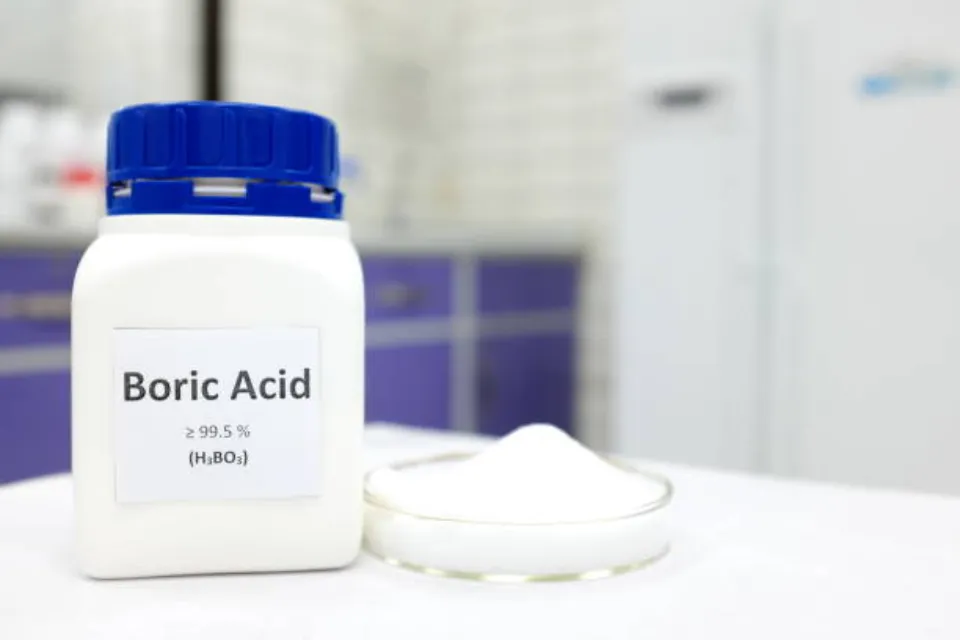
Can You Use Boric Acid on Your Period – Your Ultimate Guide
Boric acid is currently popular. However, not all trendy items are reliable or efficient. So that you don’t have to, we’ve done a thorough investigation into the use of boric acid to treat vaginal infections.
While on your period, it’s safe to take boric acid capsules, but you shouldn’t use a tampon for 24 to 48 hours after taking the supplement.
What is Boric Acid?

A chemical compound called boron, which is found in nature, is the basis of boric acid. Water, volcanoes, sea salt spray, rocks, soil dust, and some fruits and vegetables all contain it. As a stabilizer, it is frequently used in the production of cosmetics, pesticides, different cleaning agents, pharmaceuticals, and natural health products.
Because of its mild antiseptic, antifungal, and antiviral qualities, it has been used in vaginal healthcare for over a century. Boric acid is commonly used in vaginal suppositories. These products are typically sold as tiny 600 mg tablets that should be taken once daily for two weeks to treat a variety of conditions.
Can You Use Boric Acid While on Your Period?
While it is safe to use boric acid suppositories during your period, it is crucial that you know how to properly insert the suppositories. They can be used as instructed in the same manner as you would between periods. Before going to bed, ideally, place one boric acid suppository each day until the area is smell-free. Insert one suppository if necessary once every 12 hours. It is possible to insert boronic acid suppositories into the vagina with or without an applicator.

Why Would I Use a Boric Acid Suppository?
Boric acid vaginal suppositories or intravaginal boric acid (IBA) is used to treat a variety of vaginal conditions, including:
- Vaginal yeast infections often caused by the overgrowth of Candida fungus
- Recurrent vulvovaginal candidiasis, defined as 4 or more yeast infections a year, debilitating and severely impacting quality of life
- Bacterial vaginosis caused by a disruption of vaginal pH and presenting as unusual discharge, itching and vaginal odors
These conditions are often caused by:
- Normal fluctuations of hormone levels (during the menstrual cycle)
- Repeated use of antibiotics
- Pregnancy
- Diabetes and other immunocompromised conditions
- Weakened immunity
- Or as a natural reaction to another person’s genital chemistry
Self-diagnosis and self-treatment are not recommended as they can be risky and result in additional complications. Find out from your doctor which method of treating yeast infections is most effective for you. For women who are pregnant or nursing, boric acid is not advised.
Why is Boric Acid Popular?
Since the turn of the century, boric acid has been used to treat infections and discomfort in the vagina. However, its use has recently increased. There are a few reasons for this:
- Some vaginal infections are more challenging to treat with conventional medications as a result of the evolution of bacterial strains that are resistant to antibiotics. According to a study out of the Journal of Women’s Health, boric acid is “a safe, alternative, economic option for women with recurrent and chronic symptoms of vaginitis when conventional treatment fails because of the involvement of non-albicans strains of azole-resistant bacteria or Candida (a type of fungus).”
- Natural remedies are being sought after to treat medical conditions.
- In some cases, boric acid is less expensive than antifungal prescription drugs.
- Word-of-mouth referrals have aided in raising awareness of this as a possible course of treatment.
It’s crucial to remember that while boric acid may work for some people, it’s not always the best option. Always seek advice from a healthcare professional to choose the most appropriate course of action for your unique condition.
How Effective is Boric Acid?
If prescribed antifungal medications are ineffective or the infection returns and you suspect antibiotic-resistant strains, you should use boric acid as a backup treatment.
In the UK and the US, intravaginal boric acid (IBA) is currently one of the only treatments available to treat azole-resistant vulvovaginal candidiasis. If drug-resistant bacteria continue to cause vaginal infections, the widespread use of IBA might rise even more.
Despite some gaps in the research, the available data do indicate that IBA is safe to use when administered in the doses recommended by the research—600 mg once daily for two weeks. Use with caution if you have a fever, nausea, vaginal bleeding, pelvic inflammatory disease, any STIs, heart disease, or a blood vessel condition. (Read More: Can Braces Fix Gaps in Teeth)
Are There Any Side Effects?

Boric acid is between 40 and 100 percent as effective as various azole drugs (antifungals). It does not reduce recurrence and comes with some side effect warnings, such as:
- Vaginal burning sensations
- Watery discharge during treatment
- irritation and redness in the vagina.
But according to research, this still entails fewer side effects than those associated with conventional antifungal medications.
How to Use Boric Acid for Yeast Infection
There are vaginal boric acid suppositories available to treat a number of local infections.
These oval, solid suppositories need to be inserted into the vagina.
Once warmed up by body heat, the suppositories melt and turn into liquid.
The suppositories dissolve in the vagina within a short period of time.
When using boric acid vaginal capsules, a lot of women prefer to wear a pantyliner. Due to the fact that lying down will reduce the likelihood of the suppository liquid leaking, some instructions advise using one before bed.
In the case of a woman who is menstruating, these suppositories are safe to use. Tampons are not suggested, though, as they may absorb some of the boric acid.
Instead of letting the medication stain their underwear, women can use a sanitary pad.

The CDC (Centers for Disease Control and Prevention) advises using suppositories containing 600 mg of boric acid to treat yeast infections.
The medication must be taken by women once per day for two weeks.
Make sure to always abide by the directions provided on the medication’s label.
To prevent bacteria from entering the body, make sure the hands and vaginal area are thoroughly cleaned before inserting the suppository.
Proper use of vaginal capsules can be done by following these steps:
- Knees bent, lie flat on your back. A chair, toilet seat, or bed can be used as an alternative to standing up.
- The applicator should be inserted subtly into the vagina.
- By depressing the plunger, the capsule can be opened.
- Carefully remove the applicator.
Conclusion

The vaginal bacteria Lactobacilli, which helps to maintain the vagina’s acidity and stabilizes its pH balance, is found in boric acid. In other words, boric acid contributes to the environment of the vagina. The vaginal bacteria and yeast that would otherwise overgrow are stopped by boric acid. Boric acid, in turn, manages a number of vaginal bacterial infection symptoms.
FAQs
Can I Use a Suppository While on My Period?
One can use vaginal suppositories while they are menstruating. But since tampons may absorb some of the medication, they should use sanitary pads instead. Even if the symptoms disappear, the patient should continue taking the medication for the full recommended duration.
Do Periods Flush Out Yeast Infections?
Getting your period won’t “flush out” a yeast infection. A minor yeast infection may go away on its own, but more often than not, you’ll need to treat the fungus in order to get rid of the infection. Yeast infections are managed by antifungal drugs. (Read More: How Long Do I Leave Yogurt Soaked Tampon In)
Can I Treat a Yeast Infection While on My Period?
An oral medication called fluconazole frequently treats a yeast infection with just one dose. Fluconazole is a pill rather than a vaginal insert, making it probably the least messy and convenient option for people with menstrual yeast infections, though a prescription is needed.





Average Rating